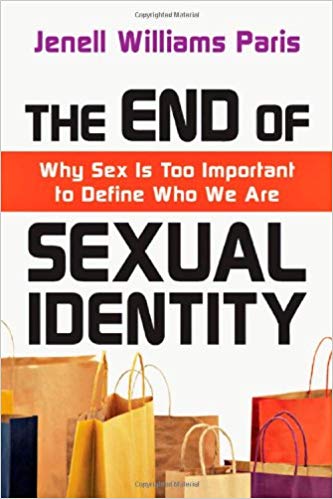The End of Sexual Identity: Why Sex Is Too Important to Define Who We Are
By Jenell Williams Paris
–Review by Vern Hyndman
When I’m working with husbands, I have a saying, “No wife picks a fight that she thinks she’s going to lose, so if your wife is picking a fight and you take it, you’re an idiot.” Military strategists for millennia have known that picking the context and defining the terms is more than half the battle. Frum Sun Tsu’s Art of War “Ground which can be freely traversed by both sides is called accessible. With regard to ground of this nature, be before the enemy in occupying the raised and sunny spots, and carefully guard your line of supplies. Then you will be able to fight with advantage.” We wage peace, not war, and yet the same concepts apply. To take an argument on the terms of others is to court disaster.
Paris’ End of Sexual Identity combines her research as a professor with a PhD in Anthropology, with her experience as a conservative Christian. This book is an excellent way to start a conversation about sexuality in the church.
Paris brings to bear incredible insight drawn from anthropology, which studies humans across all cultures, across all time. Revealed through a lens of anthropology, much of what we take as gospel around sexuality is in fact generated culturally and relatively recently. The words heterosexual and homosexual are modern words from the turn of the 20th century. “The labels “heterosexual” and “homosexual” emerged in the late nineteenth century, but medical doctors were the ones using the terms.’ Moreover, both types of people were deviants because they pursued sexual pleasure without concern for procreation: homosexuals with people of the same sex, heterosexuals with people of the opposite sex (or, in some definitions, both sexes).” (p42)
Paris reframes the conversation, and in doing so introduces what Leonard Sweet calls ostranenie; making the familiar strange again so we can see it clearly. Paris invites us to find our identity in Christ, rather than defining ourselves in terms of sexuality.
Some important quotes;
“The question “Is homosexuality a sin?” presupposes that homosexuality sexuality is a thing about which valid moral judgments can be made, and it also implies that judging is the first and/or most important portant thing Christians need to do when they encounter homosexuality sexuality or homosexuals. This book is an effort to redirect our judging energy into critical thinking: to reflect on homosexuality, which exists hand-in-hand with heterosexuality, which links to sexuality in general, which links to humanity, which links to God, which links to holiness and discipleship and grace and love. Drop off the last two words, and you’ve still got an interesting question: Is homosexuality? And if it has is-ness-if it is real-what kind of real? Is it a category that accurately patterns God’s creation, or one that distorts our understanding?” (p35-35)
“In studying cultural anthropology, I’ve learned that culture is like air: it’s a God-given gift vital for human survival and flourishing. That culture influences every human thought and word is not a disappointment; it’s an expression of our humanity.’ As our minds are transformed, we will craft social constructs-words, phrases, concepts and systems that help us live well in God’s world.” (p36)
“Deliberately betraying traying a tradition, or altering it wisely, can be just as faithful as maintaining it. Betraying heterosexuality, then, means learning to use sexual identity categories strategically (which sometimes means not using them at all), instead of being (ab)used by them when they tell us who we are, what we’re worth and with whom we should associate. It’s not about ignoring or isolating ourselves from society, since it is essential to understand what people mean by “gay” or “queer” or “bisexual” or whatever label, and engage in respectful dialogue. And it is sometimes important to be heterosexual, especially if using that label helps us serve others or pursue justice. Rather, betraying heterosexuality is about understanding cultural categories but not living by their power.
Sexuality, including both the good and the bad, is better understood stood in light of our beloved created nature, not in light of sexual desire. Identity comes from God, not sexual feelings.” (p.51)
“Holiness also doesn’t boil down the complexities of human sexuality to a list of moral rules. It’s not that rules are wrong or entirely unimportant, but they are less important than the believer’s discernment that stems from a transformed mind.” (p.90)
“Beauty is a good thing, but not when it inspires hundreds of rules which any individual is bound to violate. That’s a common distortion of beauty in modern societies that encourage people to treat their bodies as projects. Judging thirty or more body parts against dozens of standards of perfection (many of us do this daily) cultivates a judging mind which we then use in other parts of life as well.
Sexual purity is a good thing too, but when it is reduced to law, it produces shame, repression, superiority and division. Like the body, sexuality becomes a project: we assess it, maintain it, fix it, renovate it and hide its flaws. Others’ sexualities are turned into projects too when, instead of offering genuine love and mutual affection, we become the contractor they didn’t ask for, sizing up their sexuality and offering a blueprint for improvement. Churches and other Christian communities such as non-profits, companies or colleges may institutionalize a project mentality by creating processes, programs and personnel structures that honor some people more than others on the basis of their spirituality, symbolized in part by their sexuality. Thus, we may often live by Paul’s advice, treating each other in the church the way we treat our own bodies, but not in the way he intended. One student looked at the index-card card body on the chalkboard and summed it up: ‘That may be a body, but it sure isn’t the body of Christ.’” (p. 140).

